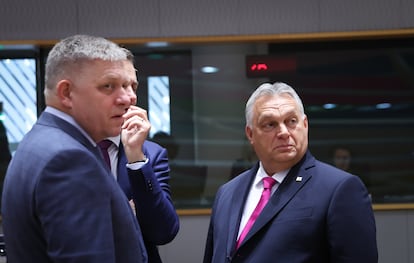Orban doubles down at an EU summit to defend engagement with Russia
His controversial stance on Russia appears to have gained an ally within the EU with the addition of new Slovak Prime Minister Robert Fico

If a warm handshake and cozy huddle with Russian President Vladimir Putin weren’t provocative enough, Hungarian Prime Minister Viktor Orban went into an EU summit Thursday saying he was right to meet the EU’s foremost enemy and that most of the other leaders were wrong.
Orban characterized himself as the only one actively seeking peace in Ukraine, though his controversial stance on Russia appears to have gained an ally within the EU with the addition of new Slovak Prime Minister Robert Fico.
As the 27 EU leaders opened their traditional fall summit in Brussels, the participation of Ukrainian President Volodymyr Zelenskyy, who will join by video link, will only increase the focus on Orban’s controversial meeting last week in Beijing with Putin.
“We keep open all the communication lines to the Russians. Otherwise, there would be no chance for peace,” Orban said. “This is a strategy. So we are proud of it. “We are the only one who is speaking on behalf and in favor of the peace which would be the interest of everybody in Europe,” he said, countering the official EU position of ostracizing Putin since the start of the full-scale invasion of Ukraine in February 2022.
And Orban will have a new ally around the summit table Thursday, since left-wing populist Fico is representing Slovakia as prime minister following his party’s election victory last month.
Like Orban, Fico has had warm words for Russia and questions about the long series of war-related sanctions imposed on Moscow. He upped the ante during his country’s election campaign when, in clear contradiction of EU policy and promises, he vowed to withdraw Slovakia’s military support for Ukraine. And he didn’t step back on Thursday. “To make it clear, I won’t vote for any sanctions against Russia unless we have analysis of their impact on Slovakia on the table,” Fico said, arguing that previous sanctions harmed his nation.
Those are welcome words for Orban as he is poised to lose his biggest ally in the bloc, the nationalist government of Poland. The opposition, led by former EU Council President Donald Tusk, won Poland’s national election on Oct. 15 and now seeks to lead the nation back to the center of EU policy-making, undoing much of the existing political alliance with Orban.
For Ukraine, much is at stake: Orban could hold up issues ranging from EU financial support and arms deliveries, and could potentially even veto Ukraine’s application for membership, a decision that requires unanimity among the bloc’s current members.
So far, though, European diplomats said that Orban’s bluster outside the summit center rarely has translated into intransigence behind closed doors. Since February 2022, the 27 nations have stuck together, even if some sanctions packages were slowed down by extra demands from Orban.
___ Karel Janicek in Prague and Justin Spike in Budapest contributed.
Sign up for our weekly newsletter to get more English-language news coverage from EL PAÍS USA Edition
Tu suscripción se está usando en otro dispositivo
¿Quieres añadir otro usuario a tu suscripción?
Si continúas leyendo en este dispositivo, no se podrá leer en el otro.
FlechaTu suscripción se está usando en otro dispositivo y solo puedes acceder a EL PAÍS desde un dispositivo a la vez.
Si quieres compartir tu cuenta, cambia tu suscripción a la modalidad Premium, así podrás añadir otro usuario. Cada uno accederá con su propia cuenta de email, lo que os permitirá personalizar vuestra experiencia en EL PAÍS.
¿Tienes una suscripción de empresa? Accede aquí para contratar más cuentas.
En el caso de no saber quién está usando tu cuenta, te recomendamos cambiar tu contraseña aquí.
Si decides continuar compartiendo tu cuenta, este mensaje se mostrará en tu dispositivo y en el de la otra persona que está usando tu cuenta de forma indefinida, afectando a tu experiencia de lectura. Puedes consultar aquí los términos y condiciones de la suscripción digital.








































